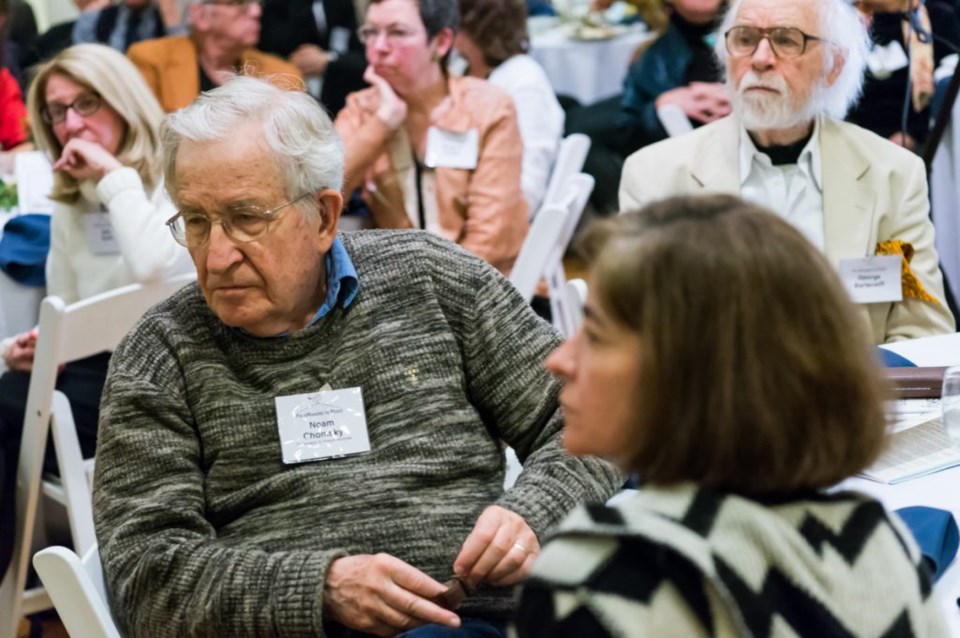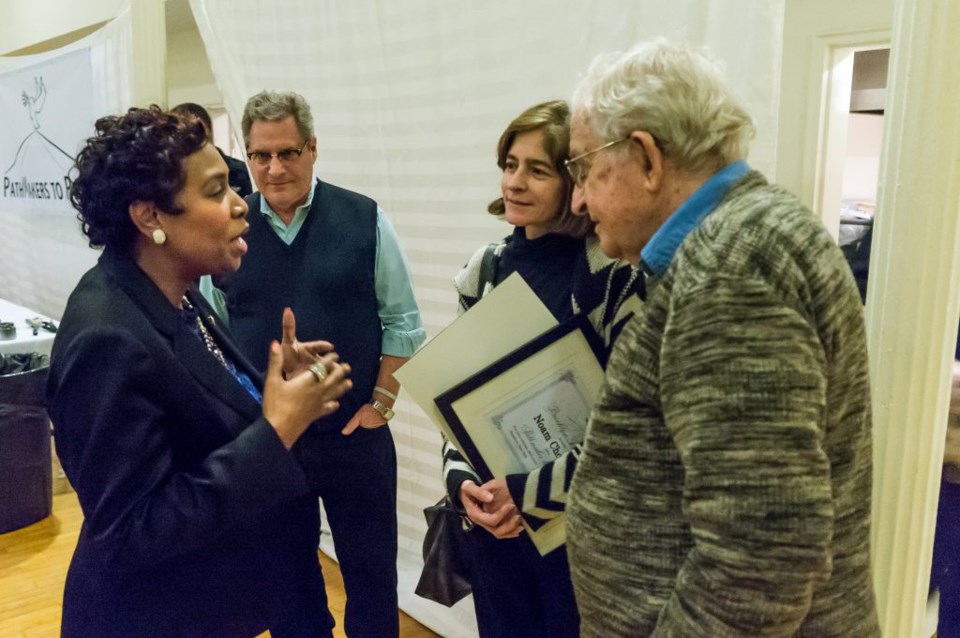By Karen Malpede
"Do you have a deep faith in reason?" Jim Peck, the interviewer and former freedom rider, asked in 1987.[1]
"I don't have faith in reason or in anything else." And yet this faithless man, Noam Chomsky, is that rare intellectual who believes ideas are actions waiting to alight and that the world might yet become the word made manifest.
Born to educated Jewish parents, Chomsky has been for many decades the world's most prominent dissident intellectual as well as a renowned professor of linguistics at MIT. Though more revered in other countries than in his own, Chomsky stands among the most brilliant yet unassuming humans this peculiar nation of former slaves and immigrants has yet produced.

Noam Chomsky spoke for 28 minutes in Brooklyn on November 15, at the 30th anniversary dinner of Brooklyn for Peace. As has often been the case, his words had a particularly powerful resonance made more so by the grand jury "verdicts" that have since been handed down.
"The United States throughout its history has been a very frightened society, unusually so," he said. Thomas Jefferson would have freed his slaves, but for the fear that "the ten-thousand reminiscences of the tortures that had been done to them" would cause them to rise up and revolt, slashing the throats of white land and slave-owners in the middle of the night.
"Anytime the political leadership, and of course the media chimes in right away, and the intellectual community, anytime they announce we are under threat, we are about to be destroyed, people huddle under the umbrella of power, it doesn't matter what they think."
Governed by fears of retribution for a violent racist past (from which they and the gross national product have reaped tremendous profits), those who hold power in the United States regularly fly into paroxysms of terror, inflicting the air waves with contagious fears of Ebola, Isil (a creation, in large part, of our imperial ways in the Middle East), young black men, or, remember, those non-existent "weapons of mass destruction" that led us into this genocidal mess of years of endless war and militarization of the police.

"We simply don't live in a functioning democracy," Chomsky said. "About ¾ of the population have absolutely no influence on policy. A fraction of 1% basically sets policy. You can't really blame the CEO of Exxon Mobile for trying to destroy the world. He's got a legal obligation to do it." That is, under law, each CEO must maximize profits for the share-holders, and so the CEO's of Exxon and Chevron have vowed to extract all remaining fossil fuels from the earth for profit despite 98% of the world's climate scientists' warning that large parts of earth will become uninhabitable if all these fossil fuels are mined and burned.
"There are two huge shadows that darken everything we think of: one of them is nuclear weapons. The other major threat is environmental catastrophe; it's imminent. It has to be dealt with."
"To overcome these things requires a major cultural change, a kind of spiritual revival you want to call it, not a small task: the lack of democratic institutions, the fact that we actually live in a kleptocracy, the lack of historical memory, the failure to understand the nature of the adversary we are confronting, these are hard tasks to overcome and they better be overcome pretty fast or we are in deep trouble."
But what precisely is this spiritual revival Chomsky says we must now have—in order for us to survive, and for the earth, which we now threaten, to continue to live.
As a young man he devoted himself to the study of language and its acquisition. Every child invents the first sentence that she speaks, he realized. Each child comes into the world knowing an inner reality that has not been learned but can be expressed by language. Each child in order to communicate creates a particular order of words to say something unique she has thought or felt, intuited or has made-up—for many children's first coherent sentences are wonderfully fanciful. Each child communicates in her own way to bring herself into the thinking human community of which she longs to become a part. "The urge for self-realization is man's basic human need," Chomsky wrote.[2]
Our perceptions matter because they are authentic works of singular imaginations. Each person's ability to speak links her through language to the larger world community that is waiting, as parents wait with baited breath, to hear the news from the mouth of the creature they gave birth.
From this early linguistic break-through to a communitarian politics in which every person's life has intrinsic value was the step that Chomsky chose to take. It was at the start of the Vietnam War; he saw how lies were being used to control free thought. Henceforth, he would live a public life; he would speak his truth and he would not shut up. American Exceptionalism (the idea the U.S. can do no wrong), our racist past and present, Israeli occupation of lands not theirs, any occupation, for that matter, wars undertaken for oil, nuclear weapons, and most of all, now, imminent environmental destruction are to be studied, understood, explained and denounced. A consistent proponent of nonviolence, Chomsky would use language to make us free.
In Brooklyn, he called for a spiritual revival now; in the final decades before the powers of kleptocracy annihilate our earth with green house gas emissions from fossil fuels, driving the temperature up and up, causing worsening storms, higher sea level rise, longer droughts, ice melts, species extinctions and other extreme weather events all of us can now see.
The spiritual revival this faithless man wishes us to embrace is one that defies all dogma. He tells us to act in the world as we truly are: not as creatures controlled by media, money, power, or ideologies, but as individuals driven by our creative understandings of what sort of communitarian world we might yet build. In the face of overwhelming state and corporate power, Chomsky calls upon us to honor our creative selves and to do the work of a free people by giving shape to multiple expressions of a nurturing collective life.
[1] The Chomsky Reader, interview with James Peck, (1987) p. 48.
[2] Cartesian Linguistics (1966) p25



